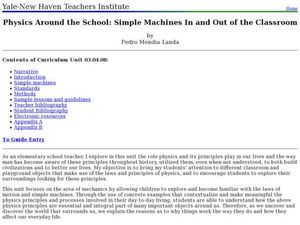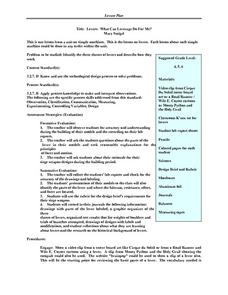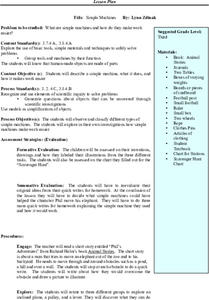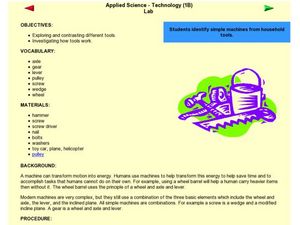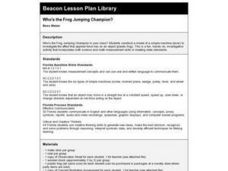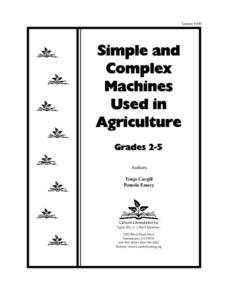Curated OER
Simple Machines IV - Wheels and Axles
Fourth graders study everyday examples of simple machines. They examine how the combination of a wheel and axle works more efficiently than either in isolation. In a demonstration lesson, they see how a spring scale shows a force pulling...
Curated OER
The Time Machine
Challenge your class with this instructional activity! Learners read The Time Machine by H.G. Wells, discuss context clues, identify main ideas and details, and analyze story elements. Discussion questions and activities are broken down...
Curated OER
Physics Around the School: Simple Machines In and Out of the Classroom
Learners explore different machines and the components that encompass the science of physics. In this physics lesson plan students explore how things move.
Curated OER
Simple Machines
First graders discuss work, force, and energy. They study how work is done. Students discuss various types of work that are done. They act out how work is done. Student draw pictures of types of work they have done.
Curated OER
Farming 1: Farming Machines
Second graders explore different farm machines. In this farm lesson, 2nd graders discover the importance of farmers, and crops. Students discuss healthy eating and how crops are packaged. Students read books about farms and how bread is...
Curated OER
Levers: What Can Leverage Do For Me?
Students determine the identity of the three classes of levers while explaining how each works. They wait a video clip that shows uses for different types of levers and work as a class to write a KWL chart. Finally, they make a model fo...
NOAA
Invent a Robot!
Wait til your class gets their hands on this! Aspiring engineers design a working robotic arm in the fifth and final installment in a series of ocean exploration lessons. Pupils learn about the use of underwater robots in ocean...
Curated OER
Simple Machines
Third graders listen to a short story entitled, "Phil's Adventures" from a book called Animal Stories. They stop at each obstacle in the story and do a quick write about how they would overcome the obstacle and draw a picture to...
Curated OER
Simple Machines/Technology
Third graders examine the concept of work as the movement of an object through a distance. They define gravity and determine what type of work is caused by gravity. They measure how far an object is moved by a force. They make a...
Curated OER
Move It!
Third graders examine simple machines. In this simple machines lesson, 3rd graders observe simple machines at work in a video, then experiment with creating their own simple machines to move objects.
Curated OER
Rube Rube
Students examine and discuss simple machines and Rube Goldberg cartoons, listing real-world examples. They design and illustrate a Rube Goldberg device, identify the simple machines involved, and write a paragraph explaining how the...
Curated OER
Gadget Anatomy
Fifth graders examine and identify different simple machines that make up complex machines. They analyze and discuss different gadgets and appliances brought in from home, then in small groups examine one of the machines in detail. ...
Curated OER
Household Tools
Students explore parts of a system. In this simple machines lesson plan, students discover that simple machines are composed of two or more systems. Students examine household tools and assess the parts of the system.
Curated OER
Experiments with Levers
Students investigate levers. In this simple machine lesson, students study levers and the mechanical advantage of using levers. They will collect data and illustrate their systems for eight different tests.
Curated OER
Who's the Frog Jumping Champion?
Students use a simple machine (a lever) to launch a plastic frog. students determine who is able to make their frog "jump" the farthest and graph the results.
Curated OER
Is a Pulley a Special Kind of Lever?
Fifth graders use information from their text to read and discuss pulleys and levers. They examine a top sketch of the arrangement of a fixed pulley. Working in groups, 5th graders perform experiments to test the effect of using a pulley...
Curated OER
Introduction to Work
Fifth graders define work, force, and energy and calculate work done using a simple formula. They observe the teacher using an Equi-beam and identify the fulcrum, calculate different work problems, and participate in a class discussion.
Curated OER
Mystery Machines
Young scholars explore simple machines and demonstrate thier acquired understanding by building a simple machine.
Curated OER
Goldberg's Gears
Students engage in a lesson plan that is concerned with the design principles employed by the engineer Reuben Goldberg. They read a biographical sketch of the artist and then create the context for studying how machines work. They create...
Curated OER
Machines
Students explain how machines make work easier. They calculate mechanical advantage. Students describe the six types of simple machines and calculate the ideal mechanical advantage for different types of simple machines.
Curated OER
Machinery In Society
Students explore technology by completing a worksheet in class. In this common machinery instructional activity, students define the different designs that make simple machines work such as wheels, pulleys and gears. Students utilize...
Curated OER
Simple and Complex Machines Used In Agriculture
Learners explore agriculture and the current technologies and research that continue to make Earth a viable planet. This four lessons unit introduce students to simple machines and the concepts of force and friction through a variety of...
Curated OER
Measuring Work
Students explore what work is, measure work done in moving an object, and tell how energy is related to work in both machines and the human body. In this measuring work lesson plan, students walk up a flight of stairs, measure the height...
Curated OER
Changes in Latitudes, Changes in Attitudes
Sixth graders discuss how people, society, and technology change over time through a unit of integrated lessons. In these changes in society lessons, 6th graders discuss the answers to many questions about how changes effect the...




